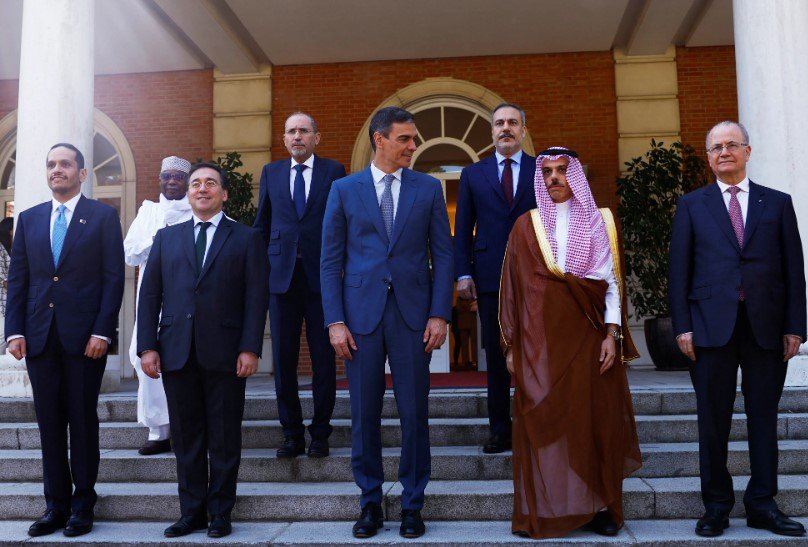Spain hosted a critical gathering in Madrid this weekend, bringing together European and Arab representatives to push for an end to Israel’s military campaign in Gaza. As the humanitarian crisis deepens, calls for sanctions and unrestricted aid have grown louder.
A growing chorus of voices from both sides of the Mediterranean is calling on Israel to halt its operations in Gaza, where a near three-month blockade has pushed the region toward catastrophe. Spain’s foreign minister, Jose Manuel Albares, has become a prominent figure in this movement, warning that silence now equates to complicity.
The conference in Madrid, held on May 25, drew diplomats from across Europe and the Arab world, including major players like France, Germany, Saudi Arabia, and the Arab League. Also present were representatives from nations that have officially recognized Palestine, such as Ireland and Norway, signaling broadening international concern.
Rising International Pressure and the Call for Sanctions
Spain’s push for sanctions against Israel is a bold step in a conflict that has long divided international opinion. Albares didn’t mince words, labeling the ongoing Gaza offensive as “inhumane” and “senseless.” His call for the international community to consider punitive measures marks a shift from diplomatic talk to potentially concrete action.
The blockade has crippled Gaza’s access to essentials—food, water, fuel, and medicine—triggering fears of famine and widespread suffering. Aid agencies on the ground repeatedly stress that the limited supplies trickling through Israel’s tight controls barely scratch the surface of urgent needs.

This humanitarian disaster underpins the urgency of the Madrid talks, where the demand was clear: humanitarian aid must flow “massively, without conditions and without limits,” and crucially, without Israeli control. Albares described Gaza as “an open wound for humanity,” a phrase that captured the gravity of the crisis and the international community’s mounting frustration.
The talks weren’t just about relief. They were also an explicit condemnation of the war’s toll on civilians, echoing a broader call for accountability. Albares’ statement that “silence in these moments is complicity” reflects the growing impatience with global inaction.
Diverse Delegations Reflect Shifting Alliances
One striking feature of the Madrid summit was its diverse lineup. Alongside traditional European powers such as France, Britain, Germany, and Italy, were delegations from Egypt, Jordan, Saudi Arabia, Turkey, Morocco, and regional organizations like the Arab League and the Organization of Islamic Cooperation.
Adding a further layer of complexity, countries like Norway, Iceland, Ireland, and Slovenia—nations that have recognized Palestine—also took part, along with Brazil. Their participation signals a broadening coalition beyond the usual Middle Eastern and Western diplomatic circles.
This mix of nations underscores how the Gaza conflict has become a global flashpoint, affecting not just regional but international stability. The varied participants bring different perspectives, but they share a common desire to see an end to hostilities and to prevent further civilian suffering.
Focus on a Two-State Solution Amid Rising Tensions
While the immediate agenda centered on humanitarian relief and pressure on Israel, the meeting also kept an eye on the bigger picture: a lasting peace between Israel and Palestine.
Palestinian Prime Minister Mohammad Mustafa, speaking at the summit, expressed urgency to “move as fast as possible” toward a peaceful coexistence. His words remind us that beneath the violence lies a deeply entrenched conflict yearning for resolution.
Spain’s Albares echoed this hope, emphasizing the involvement of more EU powers like France, Germany, and Italy as a positive sign. He reaffirmed their commitment to never giving up on peace in the Middle East, signaling that the diplomatic wheels continue to turn even in tense times.
The Road Ahead: Upcoming UN Conference
The Madrid meeting sets the stage for a key event next month: a UN conference on the Israeli-Palestinian conflict, jointly chaired by France and Saudi Arabia, scheduled to take place in New York.
This upcoming summit is viewed as a critical opportunity to build on the momentum from Madrid. The goal? To push for concrete steps that could reduce hostilities and open pathways for peace talks, even if the challenges ahead remain daunting.
While the conflict shows no signs of abating soon, the growing international coalition demanding action sends a message: the world is watching, and patience is wearing thin.
| Key Participants at the Madrid Summit | Role |
|---|---|
| Spain | Host and diplomatic driver |
| France, Britain, Germany, Italy | Major European powers |
| Egypt, Jordan, Saudi Arabia, Turkey, Morocco | Arab nations and regional leaders |
| Arab League, Organization of Islamic Cooperation | Regional organizations |
| Norway, Iceland, Ireland, Slovenia | Recognizers of Palestine |
| Brazil | Global participant |
The gathering in Madrid reminds us how interconnected global diplomacy is. What happens in Gaza is no longer just a regional crisis; it’s a test for international resolve. And as voices from different corners unite, the question lingers—will this be the moment the tide finally turns?
